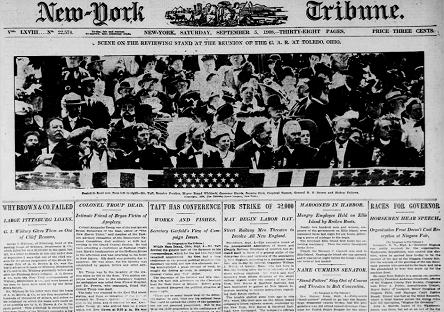It will be up later. Various obligations kept me from doing it on Thursday (which just ended for me).
Update: Here it is.
- Banker George I. Whitney of Pittsburg wrote a letter “to friends in this city” saying that among the reasons for the failure of Brown & Co. were loans made by Brown & Co. to Whitney, Stephenson & Co., which Whitney heads, and to Whitney himself. The loans were made “before and after” the collapse of Whitney, Stephenson during the 1907 panic.
- Colonel Alexander Troup, prominent Democrat and a friend and supporter of William Jennings Bryan died suddenly in Grand Central Station. His death is thought to have been caused by apoplexy.
- Vice President and Presidential candidate Taft, who is in Ohio, “devoted the greater part of the forenoon to correspondence, which for the last two days had remained unanswered,” had a conference with Secretary of the Interior James R. Garfield “on the general political situation,” and then headed off to fish in the afternoon. Garfield gives the paper his view of the political situation.
- The Amalgamated Association of Street and Electric Railway Employees of America is threatening a strike of its 32,000 New England members, which may begin on Labor Day. Background of the dispute:
The trouble started some time ago in this city [the dateline is Providence], when fifty-four men on the Rhode Island company’s street railway system, controlled by the New York, New Haven & Hartford Railroad, were discharged. The company’s officials stated that the men were released because of a breach of discipline, while the union men asserted that the discharge was the result of the formation of a local branch of the Amalgamated association.
- Nearly 200 employees at Ellis Island were stranded for six hours by a series of problems with the boats connecting them with the surrounding area.
- At the Niagara County Fair, Governor Hughes got a cold reception from the Wadsworth Republicans – apparently the machine in control of the district – but a warm reception from the general audience who came to see him.
Photo: SCENE ON THE REVIEWING STAND AT THE REUNION OF THE G. A. R. [Grand Army of the Republic] AT TOLEDO, OHIO




